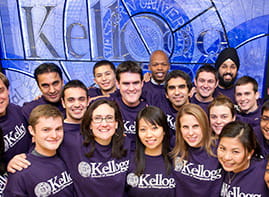How green will our future be? Foreign-policy expert Michael Mandelbaum explores the prospects and challenges of a green revolution
5/8/2009 - These days, the green revolution is in full swing. But will it maintain this momentum in the future?
“How green our future will be depends on what
you do,” said Michael Mandelbaum, the Christian A. Herten Professor of American Foreign Policy and the director of the American Foreign Policy Program at Johns Hopkins University, addressing students at the Kellogg School on May 5. “If business doesn’t go green, it’s not going to happen.”
A noted expert on the meaning and consequences of global developments, Mandelbaum served as the latest speaker in the Kellogg School’s 2008-09 Distinguished Lecture Series. He has been recognized as one of the most influential people in American foreign affairs by the World Affairs Councils of America, and is the author of
Democracy's Good Name: The Rise and the Risks of the World's Most Popular Form of Government.
During his lecture, “How Green Will Our Future Be?” Mandelbaum outlined the political and economic reasons behind a green revolution as well as the obstacles that stand in its way.
While the world isn’t necessarily running out of oil, it is running short on cheap oil. At the same time, demand for oil is rising in Asia, China and India because more residents are driving automobiles. In addition, the countries that export oil to the U.S. — such as Russia, Iran and Saudi Arabia — have the potential to use their reserves to work against democracy.
The primary alternative to oil is ethanol, which can come from corn, sugar, or “switch grass, which is the most promising source,” Mandelbaum said. “But techniques are not yet advanced enough to make switch grass commercially viable.” A long-term solution is hydrogen cars, although hybrid vehicles are a good solution in the meantime. Mandelbaum also advocates for imposing a gasoline tax in the U.S. similar to the one in Japan or Europe. “A gasoline tax would do more to get us off of foreign oil than any other measure,” he said.
Global warming is the main incentive for finding a replacement for coal. In addition to causing a rise in sea levels and loss of species, global warming has the potential to cause “climate change that will alter the pattern of the world’s agriculture, which will have social and political ramifications,” Mandelbaum said.
A carbon tax or a cap-and-trade system will reduce the amount of coal usage, but it doesn’t solve the pollution problem, he added. The U.S. needs to figure out a method for cleaning coal of carbon emissions, while developing alternative power sources, such as solar power and hydroelectric power.
Politically speaking, this is easier said than done. “Dealing with the problem of global warming is a tough sell politically,” Mandelbaum explained. “It’s asking people to pay more now to achieve a benefit that won’t happen for decades.” Moreover, some countries have incentives for allowing global warming to continue. “Russia’s GDP will rise as the earth’s atmosphere gets warmer, because they can cultivate new areas [that used to be frozen],” he explains.
There is also a debate over how urgent the problem of global warming is, and what the most cost-effective solution is. Many scientists advocate for immediate action, while some economists believe it would be cheaper for the world to wait for advancements in technology. “Thomas Friedman argues that if we take serious action now, [the U.S.] will gain economically because it will innovate and manufacture new technology that the whole world will buy,” Mandelbaum said. “That might be true, but we don’t know.”
Mandelbaum’s lecture was sponsored by the Kellogg School Office of the Dean, which produces the Kellogg Distinguished Lecture Series. The initiative brings preeminent thought leaders from academia, journalism and business to address key issues and leadership challenges confronting managers today.






